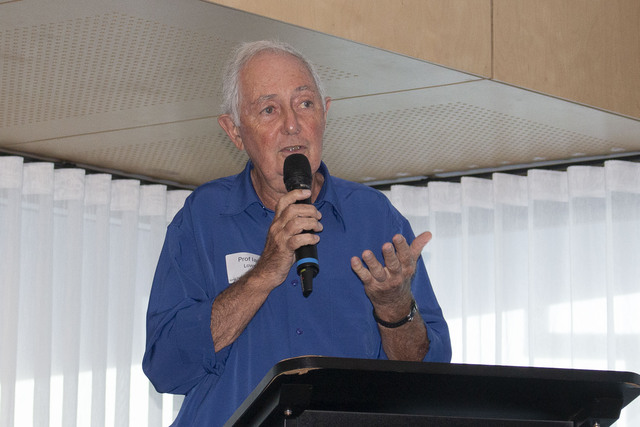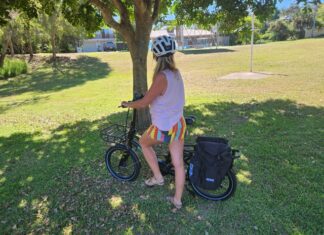Professor Ian Lowe delivered a keynote address at the Noosa Biosphere Reserve Awards last week, succinctly summarising the state of the environment while ending on an optimistic message for the future.
“The original Australians worked out over tens of thousands of years how to live within the limits of the natural systems of this harsh and unforgiving continent. They managed to live sustainably for tens of thousands of years and they embodied those knowings not just in custom and practise, not just in ceremony and dance but in their system of laws. They had a legal framework that allowed them to live sustainably, and that’s something that we should be aiming at. Now that shouldn’t be a controversial idea because 35 years ago the Hawke government announced, a process for shaping Australia would be the ecologically sustainable development process. I was on one of the nine working groups that looked at different aspects of Australia’s future – farming, manufacturing, mining, tourism, services like energy supply and use, water supply, waste man and so on. That culminated in the adoption by the councils of Australian governments in 1992 of the Australian Strategy for Ecological Sustainable Development. So in principal the commonwealth, all states and territory governments, all local governments are committed to a platform of development that does not reduce opportunities for future generations, striving for equity within and between generations, recognising the global dimensions of our activities, maintaining our unique biodiversity, maintaining the integrity of our natural systems.
It would take a very generous assessor to detect any sign of recent governments even knowing we had a strategy for ecologically sustainable development let alone see that as the guardrails of which we should be developing. And we’re not doing well. The first report on the State of the Environment said we had a beautiful and unique environment, much of it is in good condition by international standards and some of our approaches are recognised internationally as models of good practise but that report said we had five serious problems that needed to be addressed if we were to achieve our stated goal of developing sustainably – loss of our unique biodiversity, loss and degradation of rural and farming land, the state of our inland rivers, particularly the Murray-Darling, pressures on the coastal zone from increasing population and urban development and rapidly increasing greenhouse gases contributing to climate change. There have been five subsequent reports. They said we have five serious problems. Stop me if you’ve heard this one.
They’ve all defined the same five serious problems. The most recent one released by our current Environment Minister Tanya Plibersek after being withheld by the Morrison government, was presented alongside the review on environmental laws. She said these two reports show they are not adequate, they are not protecting the environment. We are losing our unique biodiversity, we need an environmental authority with teeth, and we need better environmental laws. We are still waiting. In a sense we are part of a global problem. In 1992 William Ripple coordinated the Worlds Scientists Warning to Humanity, that we are stretching the natural systems of the planet and we will suffer very bad consequences if we continue to ignore the ecological reality. In 2017 he coordinated a 25 year review, the second warning to humanity and I’m one of the 15,000 scientists to endorse that warning, saying that in the last 25 years we’ve made progress on one single environmental fault – the depletion of the ozone layer because of the Montreal Protocol goal and subsequent tightening of that has managed to reduce the ozone-depleting substances and the depletion of the ozone layer has altered. We can think that it might repair over the next 50 years, that’s a reasonable assumption. All the other global problems are getting worse, freshwater per capita is down by 25 per cent, the world fish catch is down by 20 per cent, the number of ocean dead zones has doubled, we’ve lost 100 million hectares of forest, greenhouse gas emissions are still increasing, climate change is accelerating. Perhaps the most disturbing, the loss of biodiversity is comparable with the five great extinction episodes in the previous history of the planet. In 1992 species diversity was down to 60 per cent of the 1970 level. The more recent report shows it’s down to 40 per cent of the 1970 level. We simply don’t know the consequences of pulling random bricks out of the wall of life and are oblivious to the fact whole sections can collapse. So how can we stay optimistic? Well we can look for positive change and there is some good news. On present trends this will be the first year in which greenhouse gas emissions are less than the previous year. We have turned the corner and are phasing out fossil fuels because of the dramatic improvements of the economics of solar and wind, which means old coal-powered power stations and nuclear power stations are being closed down because they can’t compete with the new energy technologies. The British electricity authority has just released its projections for 2030. If you think about solar energy the UK’s not a great place to go, but in their projections for 2030 they are looking at a doubling of offshore wind, a doubling of onshore wind and a tripling of solar so that by 2030 wind and solar together produce somewhere between 100-110 gigawatts of electricity. That’s about two and a half times our total installed capacity in Australia. Over 100 gigawatts of renewables by 2030 and 25 gigawatts of storage, and in case you believe the fantasies of our (nearby) local Member, of nuclear having a role, if one nuclear power plant is commissioned by 2033 that will increase the capacity from 3.5 gigawatts to 4.1 compared to over 100 of renewables. The world has made up its mind. Someone should tell the Member for Fairfax that nuclear doesn’t make economic sense, it doesn’t make environmental sense, it doesn’t make social sense, it doesn’t make political sense.
The other thing is while we can’t solve the global problems we can do things locally. In a time of crisis in Western Europe the French philosopher Voltaire said we can all cultivate our garden. We can all look after our local corner. We’re not just doing good locally, we’re also setting an example for other people. The Noosa Biosphere by demonstrating we can have a civilised lifestyle while maintaining the integrity of natural systems is an example to the rest of Queensland, an example to the rest of Australia, ideally an example to the rest of the world. I studied in academia a little government agency called The Australian Commission for the Future and it’s motto was the future is not where we’re going, it’s something we’re creating. There’s a wide range to possible futures. Just as the Australia we live in today is the product of decisions and actions, the Australia of the future is the product of decisions and actions. The fundamental point is that we should be striving above all else to maintain the integrity of the natural systems on which we depend. Politicians seem to obsess about the economy and they seem to think that as long as the gross domestic product is sufficiently gross we can always solve our problems.
The economy gives us a lot of things that we want but it also produces a lot of things that we don’t really need and have to be persuaded by slick advertising to purchase. But natural systems give us what is absolutely essential – breathable air, drinkable water, the capacity to produce our food, other things that are important, like the sense of place we get from our surroundings, and the spiritual refreshment we get from being in natural areas. So above all else we should be thinking every day how can we make a difference, how can we contribute to sustainability. We hear tonight people who have made major contributions, but there are things we can all do. Every day we all make decisions that make some futures more likely and others less likely. I became a grandfather a few years ago and the test I apply when I’m thinking of hard decisions is what will my little granddaughter think. Will she when she’s my age reflect that we were wise and thoughtful and tried to ensure a good future for her or will she be appalled at how selfish and short-sighted we were. I think we should celebrate the successes we are here to mark and we should also take heart and renew our personal commitment to do what we can do to create a more sustainable world. We shouldn’t wait for other people. We should all be doing what we can. Just as we inherited Australia from our forebears we hold it in trust for our children, our grandchildren, for all future generations and for the plants and animals that can not express their wishes but depend on us to behave responsibly.”









